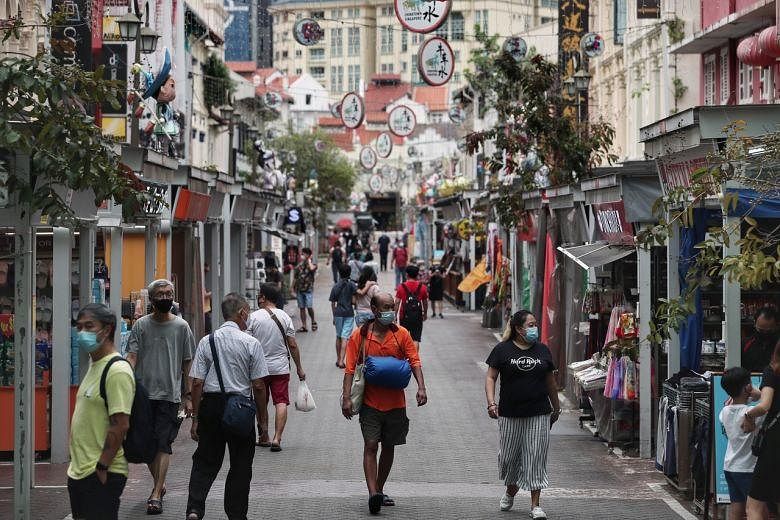SINGAPORE - Companies looking to grow their businesses, increase productivity or expand overseas will soon be able to tap bigger grants and expanded loan schemes.
These moves will provide more support for businesses during the Covid-19 pandemic and help them to transform, Trade and Industry Minister Chan Chun Sing said as he announced enhancements to several grant and loan schemes on Monday (Oct 12).
Bigger grants, expanded loan schemes
Firms looking to internationalise will be able to have up to 80 per cent of qualifying costs covered from Nov 1 to Sept 30 next year - up from 70 per cent currently - under the Market Readiness Assistance Grant.
The scope of the grant's coverage will also be extended to cover participation in virtual trade fairs to encourage companies to find new overseas opportunities through such platforms, Mr Chan said during a virtual media briefing.
Retailers in particular would be wise to expand their reach overseas, as the Covid-19 pandemic has accelerated the growth of online shopping and opened up new opportunities, he said.
The higher level of support currently available to businesses looking to pivot, grow and digitalise will also be available for an additional nine months from Jan 1.
The Enterprise Development Grant and Productivity Solutions Grant will cover up to 80 per cent of qualifying costs until Sept 30 next year, after which they will cover up to 70 per cent.
More help will also be available to businesses seeking loans.
From Jan 1 next year, construction companies can apply for loans to finance the fulfilment of secured domestic projects with at least half of the risk shared by the Government.
This temporary adjustment to the Enterprise Financing Scheme - Project Loan, which currently only covers overseas projects, will end on March 30, 2022.
The Temporary Bridging Loan Programme, which provides access to working capital at a lower interest rate, and a financing scheme for trade loans will also be extended by six months to Sept 30 next year.
Both schemes will see the Government's risk share lowered from 90 per cent to 70 per cent from April 1, however. The maximum loan amount for the bridging loan programme will also be lowered from $5 million to $3 million.
These schemes are no longer about tiding businesses over the current crisis, but helping them to adapt to the new reality, Mr Chan said.
Bumpy road to recovery for retail sector
The retail sector faces a bumpy road to recovery, said Mr Chan after a visit to SK Jewellery's headquarters in Changi Business Park.
He noted that the sector had already been facing structural challenges before the pandemic hit, such as the rise of e-commerce and a lack of innovative concepts and experiences.
The outbreak has dealt it another blow, he said, with retail sales suffering an unprecedented year-on-year drop of 52.1 per cent in May, when shops were forced to shut.
While sales have been on the rebound since shops have been allowed to reopen, takings were still down 5.7 per cent year-on-year in August.
Cyclical forces will continue to impact the retail industry as consumer confidence is lower and their purchasing power is constrained, he said, outlining three ways the retailers can transform to survive.
Firstly, they will need to adjust to new consumer behaviours and create unique selling propositions, he said.
Citing SK Jewellery as a retailer that has been successful in this regard, he noted that its line of lab-grown diamonds, launched last year, caters to younger consumers who are increasingly conscious of the environmental and social impact of their purchasing decisions.
Retailers also cannot depend on domestic sales alone, Mr Chan said. They should leverage programmes such as the Grow Digital Initiative to expand abroad without the need for a physical presence, he urged.
Lastly, retailers should create value through intangibles such as service and design to help set their brands apart, Mr Chan said.
The retail sector contributes about 1.6 per cent of Singapore's gross domestic product, and employs 4.1 per cent of the workforce.


